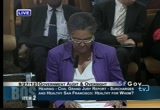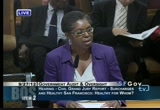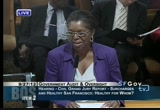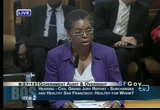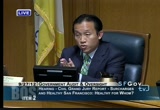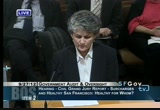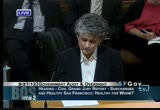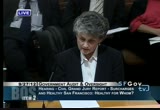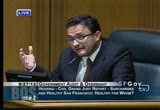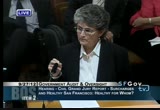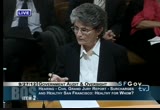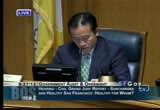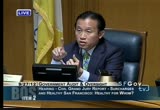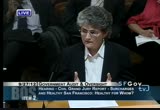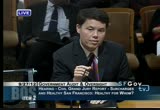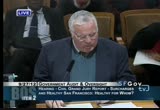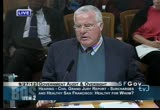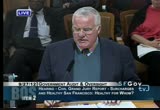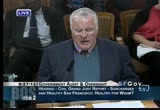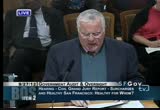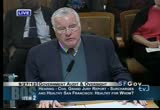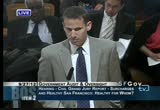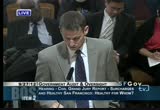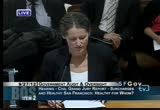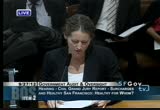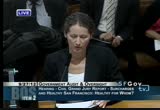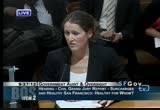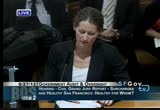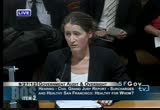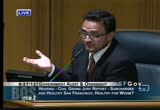tv [untitled] September 27, 2012 2:30pm-3:00pm PDT
2:30 pm
the medical reimbursement account to pay for health insurance premiums, we provide quarterly statements to employees so that they're aware of the funds that are in their account and we try to encourage them on a regular basis to use that account for health care expenditures. now, turn tog the civil grand jury's report, there were 9 requests for responses from the department of public health, 7 related to findings and two related to recommendations, the department affirmatively responded to three of those and i'll go through them. one had to do with just giving some perspective of the different participation rates of the medical reimbursement account and the health reimbursement account. we partially disagreed with the finding in part because it was based on the unbacker understanding of the dem ragpickers of both population, those with hra's and mra's and
2:31 pm
the sdpt of public health has no information with respect to the demographics of those individuals in hra's, we did however indicate as i just mentioned the range of provisions that we had in our mra's to facilitate high utilization, the second finding ak humbly is finding 112 which related to whether or not hra's were allowable or are allowable under the affordable care act. we were unable to respond to that finding, and finally we did disagree with the recommendation r5 which is essentially requested that there be an elimination of time limits for the medical reimbursement accounts under the city option. there are no time limits for the medical reimbursement accounts under the city option,
2:32 pm
therefore we disagreed. of the remaining findings and recommendations, we're not in urn the purview of public health so we appropriately referred and deferred rather our comments and/or perspectives to the appropriate departments, they were findings f1, f8, f11, f13 and f13 to the office of labor standards and enforcement and finally recommendation of 4 which related to whether or not hra's should be disallowed under the health care security ordinance, we felt was more appropriate for the city attorney to be able to respond to that from a legal perspective, so we did not respond to those. let me close by saying that the department of public health has worked closely with the office of labor standards enforcement from orders of the executive order which was signed in the
2:33 pm
latter part of 2011 and specifically we have worked to target those employees who work for employers for whom the office of labor standards has identified or were investigated in terms of perhaps not inappropriately, providing information or lack of information to their employees with respect to the health reimbursement account option, we have sent letters tho those employees advocating and stressing two areas, one, their rights under the hra and then number two, stressing how they can use their hra to advance and use it for primary care, preventative care and understanding the range of subsidized service that is are available in the city and county of san francisco, so with that, if the board has any questions, i would be happy to answer them. >> colleagues, are there any questions, president chu?
2:34 pm
>> not so much a question, just a comment for the public, i know there were questions raised about why we decided to move from a one year calendar requirement to a two year rolling requirement, and the rational is -- come from the affordable act, president obama's health care bill is merited to go into effect, so it's to ensure that dollars that employers are supposed to put into these accounts go to health care and then the idea was we were going work with your office to determine once these federal regulations that come down, if there are additional changes that be made, if they come down, if you could brief those of us working on this issue, some recommendations that we should think about when president obama's health care law goes into effect, we would love to get that information. >> we will certainly do. >> we'll next ask the district attorney to -- office of the
2:35 pm
district attorney to present, followed by the treasurer, tax collector and then the city attorney, so welcome. >> good afternoon, members of the committee, i stated in our response to the grand jury report the district attorney opened a preliminary review into possible consumer fraud issues related to the collection of surcharges back in 2011. in that review is still open and pending. we read with great interest the report of the grand jury and have requested that the foreperson provide us with the underlying documents from which the data were derived. our understanding is that he is consulting with the grand jury's counsel to work out privilege issues to determine whether this information can be related to us. we look forward to working with the grand jury and hopefully we'll be receiving as much as they can possibly provide to us without having any privilege
2:36 pm
issues. going forward, it is our understand hating the olse will be auditing employee's surcharges in the course of investigating employee complaints, about evaluations of the hcso, section 14.3 subsection d, the olse may refer consumer fraud to our attention, we will upon any receipt of such complaint review the matter to see if there is a basis for any further investigation, however, under the current wording of the ordinance, we believe it would be difficult if not impossible to maintain a criminal prosecution for consumer fraud based on the collection of excessive surcharges in many cases. as the grand jury pointed out in its report, employers are increasingly using surcharges labeled in a way that is not limited to offsetting the cost of the chso, those broadly labeled surcharges seek to offset a variety of costs of doing business in san francisco. including but not limited to
2:37 pm
complying with the minimum wage and sick pay ordinances, both the city attorney and the olse grie with the grand jury that administrative enforcement of section 14.3 subsection d against employers who use these more broadly labeled surcharges will be extremely difficult. criminal enforcement by means of a consume fraud prosecution, charging a business with not properly spending the money collected for the broad purpose stated in these surcharges is obviously even more challenging. >> thank you very much, supervisor compos? >> i do want to thank the district attorney for looking into this and i'm glad there is an investigation. i do have to say that i feel that even though there are efforts on the part of the local government to address this issue, i do think there are already in the books state laws that might get to the heart of what's happening here
2:38 pm
and i just, i really hope that there is a thorough investigation that goes beyond what olse is doing because i do think they have limited resources, and it's not a good thing to hear that it would be almost impossible to bring a case forward based on the wording of the law because we -- even though i did not support the amendment, i was hoping that the amendment would give the city the tools to be able to at least prevent fraud, so it's not good to hear that tha* the current wording of the law does not give the d.a. the tools to do what i would hope it would be able to do. >> and the d.a.'s office would be happy to work with the members of the committee to talk about the ways in which the laws may be able to be change sod we can have an enforcement tool that works.
2:39 pm
>> because i think this adds something that hasn't been a part of this discussion, you know, all along with respect to this amendment, we've been saying why from a public policy standpoint we don't believe the amendment goes far enough, but what we are hearing now from the d.a. is the amendment as worded does not give the district attorney the tools needed to prevent consumer fraud and i think that's a problem. >> and i just want to make sure that i'm understood as far as where i'm going in terms of which types of surcharges would be problematic under the current wording of the ordinance. for those employers who use a surcharge for health care benefits as an scho mandate surcharge, the work that's going be done by the olse is going to be helpful in determining whether or not that money is in fact being used for health care, the problem comes with the more loosely worded surcharges which are basically
2:40 pm
trying to state to the customers, we are going to be surcharging you for the added cost of doing business in san francisco. there's not going be a whole compendium of tax receipt of what that means, so then it's the job of our office or other prosecutors to try to say, well, it's consumer fraud because you're misrepresenting to the customer what you're using it for when in fact if you look at the loosely worded language on the receipt, you can't really say that in fact it was a misrepresentation and that's where the problem lies. >> well, i think -- i don't want to -- because we have a number of people that want to speak, but i think what the district attorney just said i think proves the point that i have been trying to make is that you may play with lang wamg, you may say we don't want them to do this or that but at the end of the day, so long as the law allows them to collect money and not necessarily spend
2:41 pm
it and you don't define expenditure the way we were trying to do, this is going continue to be a problem because there are ways that they're always going to be able to manipulate the wording of the surcharge, so i think that's a problem and i think that the d.a. only confirms what we've always said. >> president chu? >> i had two observations as i compared our city attorney's response to the same question, our city attorney said, yes, consumer fraud is committed, you clarified the burden of proof required in the criminal context from my perspective, i think that makes sense, these type of consumer fraud cases are pursued from our civil attorney, i wanted to make that first point, but secondly, i
2:42 pm
think what ms. crevette was saying, rather than having a surcharge for health care, they broaden that language and said it was a surcharge for the cost of doing business in san francisco, that's a very different set of issues and it might be a set of issue that is we may want to tackle at a later point but it gets us beyond the health care situation, it could be surcharge that businesses justify because of our city's living wage law, sick leave, health care and all the compendium or payroll tax, all of the variety of cost of doing business and this is why i think i understand from what you're saying, that would be harder to prosecute, i completely understand that. we may decide that's a problem, but i think that's what i hear you saying, you're not necessarily saying if the surcharge was on health care and that money was not used for health care, that that would be -- to me, that's much more clear cut situation. >> that's exactly what i'm
2:43 pm
saying but i do want to say it's not theoretical, without going into the open investigation that we have, i will say that it was obvious to me as i think it was to the grand jury that they're moving to a broader surcharge language, at least a number of them are and that trend may continue, so that the ability to track exactly what they're taking in and what they're paying out and whether or not they're making any type of misrepresentation to their customers is more difficult. >> thank you, logs, any -- colleague, any additional questions. er >> we'll hear from the tax collector's office, thank you very much. >> good afternoon, supervisors, san francisco treasury tax collector's office, our office
2:44 pm
was asked to respond to one finding and one recommendation regarding investigating the potential and the reporting of sales tax in accordance with these health care surcharges, unfortunately, those were not appropriate findings or recommendations because our office does not collect the sales tax, under state law, the board of equalization is the agency that collects sales tax, so while we do share the concerns of the civil grand jury, we will have to defer to the board of grand jury to their equalization efforts. er >> given that, maybe it's the appropriate time to ask the board of equalization to come up. michael lawrence. >> thank you. >> thank you very much for being here today. >> good afternoon, my name is
2:45 pm
mike lawrence, i'm the district [inaudible] the board of equalization as you may be familiar with is tasked with the responsibility of collecting and maintaining the sales and use tax program within the state of california along with a whole host of other types of taxes including environmental fees, timber tax, property tax, cigarette, alcohol, i believe there's over 20 taxes that are involved. in response, i believe finding number 3 was what we were asked to respond to and on september 10 or a letter dated september 10 was provided to the grand jury. i don't know if that is -- if you've gotten that or what. i mean, so what i will do is summarize that letter and explain what actions the board of equalization has done in regards specifically to the surcharge.
2:46 pm
sales tax applies to the sale of tangible personal property and the amount upon which that tax applies is the gross receipts under 6012 which is our reference, the gross receipts are anything that are charged so if you go into a liquor store and you buy some beer and it's 5 dollars, we want sales tax on five dollars, gross receipt ares also going be defined as any surcharges that are added and on a number of occasions, we do come across surcharges, for example, there may be a credit card surcharge, that is part of gross receipts and would be taxable, or in some cases, there is a fuel surcharge when the price of fuel becomes exorbitant, some businesses say, this is what the price of fuel is plus there's a 10% surcharge, that is an element of %mpart of gros receipts and that is going be
2:47 pm
taxable. in the specific case of the san francisco ordinance for health care, we recognized early on when we first learned about it in 2008 and we knew it was unique to san francisco, now, our office covers san francisco and san mateo counties, but we knew the ordinance was unique to san francisco and we recognize that it would be incumbent upon us, it would be our duty to ensure that the retailers of which already 26 thousand retailers in the city and county of san francisco were aware that any surcharge would be taxable. this was done so that we audited after a three year cycle, we don't come in and unnecessarily penalize people because they didn't know something, so on a proactive basis, that was our response and we sent out i believe in 2009, we sent a tax information bulletin to the 26 thousand
2:48 pm
permittees in the city and county of san francisco which would not only include restaurants but liquor stores, leasing companies, banks, anything that would require a seller's permit, so that notice was sent out in 2009 so that those retailers would be aware that if you're channeled any kind of a surtax, it's going be taxable and should be included as part of your gross receipts, whether it's 4%, 7% or a 50 cent surcharge, that's part of gross receipts, in addition to sending out the notification, we have an active audit program, when we select accounts for audits, we have a full spectrum in where we cover san francisco and san mateo county ts, it's all kinds of businesses of which restaurants would be some of them, as part of the mandatory audit program, when an auditor does a restaurant in san francisco, he is required to determine if on
2:49 pm
the sales ticket or on any kind of an invoice, there's a surcharge, if that surcharge is not taxed, then that additional surcharge becomes part of the audit adjustments and becomes part of gross receipts. there's also a required comment so that in some situations, because it's my understanding that from -- anywhere from 1 to 19 employees, there is no health care fee, and also it could be that the health care fee is incorporated within the charges, you may not necessarily have a surcharge, there's a mandatory comment that the auditor investigated if there is a surcharge and how this was handled. i think also just in sitting here in the audience and reading the grand jury report in preparation for this, it is of interest to us and we will
2:50 pm
request to see what can be done dealing with the office of labor standards enforcement to see who they have in terms of charging the surcharge so that we can work in conjunction to ensthaour that the sales tax is appropriately billed. if it is billed, there is no issue, if not, then certainly that would be something we would be interested in from that perspective. that is a summary of what this september 10th letter is and i hope i have addressed it so i'm open now to any kind of questions. >> thank you, any questions? terrific, we very much appreciate the information. >> thank you very much. >> okay, next we will hear from the city attorney's office. and then after the city attorney's office, we'll hear from the mayor's office. >> john gib ner, deputy city attorney, i will be brief. we were asked to respond to three findings, numbers 5, 6 --
2:51 pm
four findings, 5, 6, 7 and 12 and three recommendations, 1, 3 and 4, i believe olse responded to number 5, basically the same content as we did, finding number 6 regarding auditing by olse, we deferred to that department. finding number 7, that when a business tells customers it's going be using a surcharge for one purpose and uses it for a different purpose, that is consumer fraud, we agree with the grand jury on that, as you all know, our office has a long tradition of aggressively enforcing consumer fraud laws and of course we'll continue to do that. finding number 12 is -- states that hra's may not be an
2:52 pm
allowable option nrords to the health care plan, as to several of the responses indicated, there are pending regulations in implementing the care act and once those regulations are issued, we will of course brief the board and all affected city departments under effect on our ordinance. as for the recommendations, they primarily -- recommendation number 3 asks the district attorney to open an investigation and of course we deferred to the district attorney on that, recommendations 1 and 4 are really policy questions as to potential amendments to the ordinance which of course are matters for the board and we are of course always available to provide advice on any possible amendments. >> any questions, colleagues? okay, thank you very much, we'll hear from ms. terrell
2:53 pm
from the mayor's office, and after the mayor's office, we'll hear from the golden gate restaurant association which at that point we'll open it up to public comment. >> thanks for having me today, i did want to say thank you for the civil grand jury for taking on a complex topic, it's certainly on top of minds with the board, with the mayor and with a number of members of our community as well as the civil grand jury and i think rightly so given the changes that have happened. i did want to step back just for a minute to review some of the other stuff that preceded the civil grand jury report, in addition to the legislative change of mr. gold berg and supervisor chu outlined, the mayor also received an executive directive, he also fully supported those legislative amendments and in partnership with that looked at collecting additional data
2:54 pm
around the hra accounts, around restrictions, etc.. i believe most of you are aware of that executive directive, i have a copy of that with me which i can certainly distribute that with you if you would like to see. okay. so, let me just quickly go through the components. directed olse to collect additional data from employers providing hra's with respect to what types of hra's are restricted what types of medical services or premiums that the employer did reimburse. he also asked olse to specifically track hra reimbursement rates distinctive from all the other reimbursement accounts and to compare those accounts to reimbursement rates, he also decked olse to employ on which
2:55 pm
employers allow employees to draw down hra funds to cover health care. he asked our department specifically olse the office of small business and dph to conduct employee outreach around their rights and obligations under the health care security ordinance. and he called for a qualitative research effort to better understand employee barriers, real or perceived to accessing hra funds sparkly, that's something that we are working on doing that, i'm work -- working with many of the departments, privacy may be one that we would look at, but looking at it, i think ideally within those employers that are doing a real ri good job of drawing down and doing those reimbursements, what are the best practices and also looking
2:56 pm
at likely would be within the pool of employers that olse has investigated, what are the barrierser because olse will be doing direct files of those employees regardless, so we'll have more findings in the coming months and i will share that with the board. >> he wanted to get a sense of and members of the board wanted to work from the foundation of data in addition to the anecdote tam information so we look forward to the 2011 report being a good baseline and looking at that comparison coming out of the 2012 report, i think the mayor does trust what businesses currently report and it really is that trust that verified approach that we as a city espouse, we have many departments with data, and looking at creating avenues within departments for how they do that verification,
2:57 pm
and i think ultimately we will never be able to fully staff to do all the enforcement that we would love to do, so i think it's looking at how do we look at our resources wisely to do that and i think it's watching closely as olse does this report, and i think we did in this budget look at adding additional resources to them to help them with their work. and i think also not the least of which is also looking at how do we -- a lot of this policy work, and i'll step back for a minute, i think beginning with a very genesis of this policy, it's a collaborative process and i think we look at all the stakeholders in that process continue to being engaged, through enforcement only, we'd have a low measure of success compare today the level of success we could have to the shared commitment to this policy, we look at this data
2:58 pm
and regulations to help in outreaching to their peers on how do we have better outcomes. i think it's also important the notification to have employees understand exactly what their options are and more importantly, where do they go when there are problems and doing a better outreach, when dph started with mra's in the first year, there was a low reimbursement rate, it was under 15% and you can see how that reimbursement rate has gone up significantly due to the strong outreach they have done, the hope is that will continue to happen and we will soon know if that worked or not. in respect to the mayor's grand jury responses, i would propose to the supervisors that i just go through the findings and recommendations that other departments haven't responded to. in most cases, all of the
2:59 pm
cases, the mayor's findings are in accordance with the department's findings. >> on the enforcement piece, and i appreciate that the mayor trusts the business community and we want to trust the business community as well, and i do believe that one of the good things about these reports is it shows the vast majority of businesses are playing by the rules, we're going to hear from the golden gates restaurant association and i know they want their members to comply with the letter and the spirit of the law as well, but it's not just trust, you have to verify, so with the mayor's support augmenting the resources, olse, we have audits, which right now, as they said, they're taking the information at face value, so would you support would
166 Views
IN COLLECTIONS
SFGTV: San Francisco Government Television Television Archive
Television Archive  Television Archive News Search Service
Television Archive News Search Service 
Uploaded by TV Archive on

 Live Music Archive
Live Music Archive Librivox Free Audio
Librivox Free Audio Metropolitan Museum
Metropolitan Museum Cleveland Museum of Art
Cleveland Museum of Art Internet Arcade
Internet Arcade Console Living Room
Console Living Room Books to Borrow
Books to Borrow Open Library
Open Library TV News
TV News Understanding 9/11
Understanding 9/11